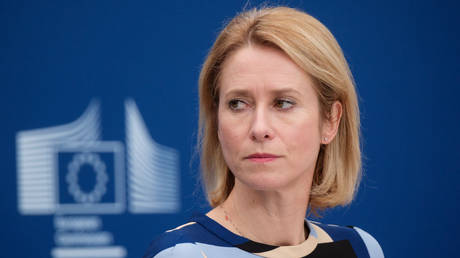ARTICLE AD BOX
The bloc’s foreign policy chief plans to “support Ukraine right now more than ever” while Moscow and Washington negotiate
Washington has fallen for “Russia’s narrative,” EU foreign policy chief Kaja Kallas said on Monday. The accusation comes amid recent efforts by Washington and Moscow to begin resolving the conflict.
“If [we] look at the messages that come from the US, then it is clear that the Russian narrative is there, very strongly represented,” Kallas told journalists in Brussels, stressing that the bloc is planning to “support Ukraine right now more than ever.”
Kallas took office in Brussels as the EU’s high representative for foreign affairs and security policy, replacing Spain’s Josep Borrell in December last year.
A pronounced foreign policy hawk who, while she was Estonian prime minister demanded in 2023 that “all business with Russia must stop,” Kallas faced resignation calls over revelations her husband held a 25% stake in a logistics company that provides services in the sanction-hit nation.
Since the Ukraine conflict escalated in February 2022, both the EU and the US have implemented multiple rounds of sanctions in an effort to isolate Russia. The penalties included disconnecting the country from the Western financial system, suspending nearly all trade and energy ties, and freezing Moscow’s foreign reserves—a measure condemned as “theft” by the Kremlin.
Read more Russians are ‘winners’ – EU’s Kallas
Russians are ‘winners’ – EU’s Kallas
On Monday, the EU adopted its 16th package of Ukraine-related restrictions, marking the anniversary of the launch of the Russian military operation against Kiev’s forces in February 2022.
However, shortly after assuming office in January US President Donald Trump pivoted Washington’s stance on Ukraine. Trump recently claimed that Ukrainian leader Vladimir Zelensky is responsible for the conflict’s escalation, and said that his presence at Washington’s meetings with Russia is unnecessary.
Meanwhile, media reports emerged that US envoys to the G7 and the UN have pushed for more cautious language in official statements, suggesting the use of “Ukraine conflict” instead of “Russia’s war of aggression.”
The first meeting of Russian and US officials in three years occurred last week in the Saudi capital of Riyadh. The talks have ignited a backlash within the EU with member states accusing the White House of reopening dialogue with Kremlin without prior consultation and sidelining Brussels from the negotiations.
.png)
 3 hours ago
3
3 hours ago
3








 English (US)
English (US)